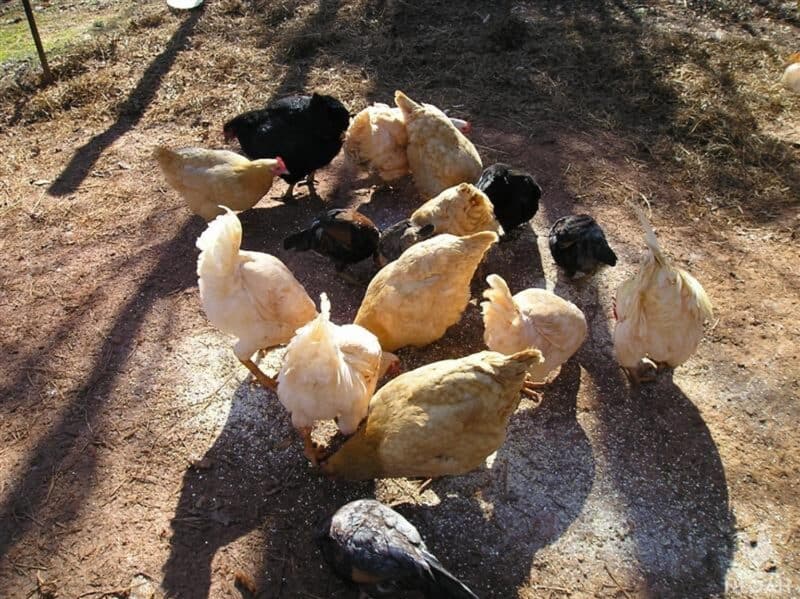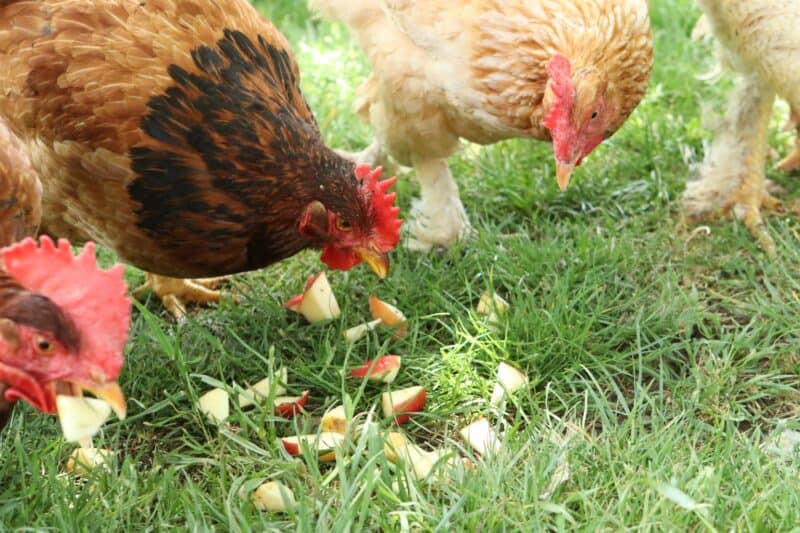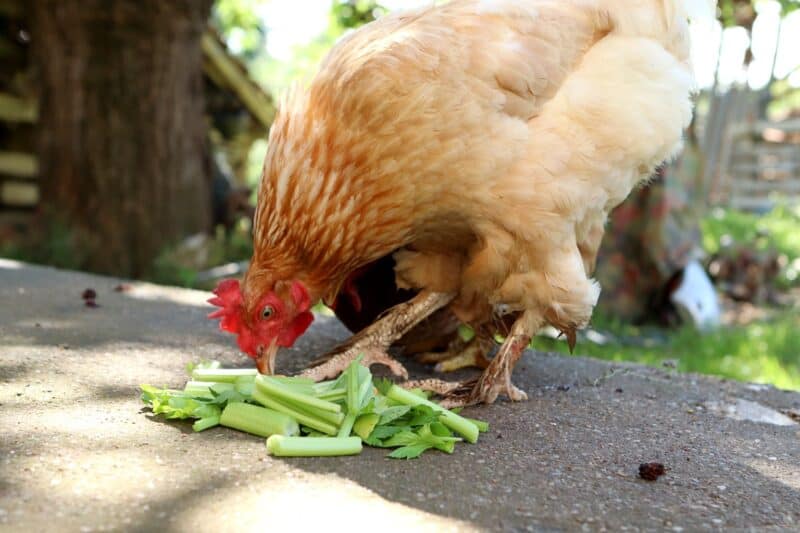When it comes to chicken nutrition, there are a lot of misconceptions out there. People often think that domesticated chickens only eat feed, but that’s not the case at all.

Chickens are actually omnivores and will eat a variety of things in the wild.
With increasing interest in true “free range” lifestyles and diets for chickens, new generations of keepers want to know what chickens would naturally eat from the environment around them if left to their own devices.
So, what do chickens eat naturally?
Chickens are omnivores, and have a varied diet consisting of plant matter, fruits, vegetables, seeds, grass, insects, arthropods, snails, worms, small reptiles and amphibians, small mammals, carrion, and even eggs. Chickens will also consume grit to help with their digestion.
While chickens in the wild have a varied diet that they find on their own or in the environment, domesticated chickens are typically fed a diet of chicken feed.
In this article, we’ll take a look at some of the different things that chickens would eat naturally.
This will help you be better informed when it comes to adding items to your flock’s menu, as well as the benefits of feeding your chickens “natural” fare. Keep reading to learn more.
1. Plant Matter
Chickens will eat readily eat the leaves, stems, roots, vines, and buds of many plants. They are especially drawn to soft plants that are easy to tear apart and swallow.
Though not the most important part of their diet, plant matter like this nonetheless provides calories and nutrition, and is a ready source of food when better options are scarce or unavailable.
However, chickens must be careful with some plants since they can be tough, posing a digestive hazard, toxic, and capable of poisoning a chicken.
Luckily, most chickens instinctively avoid nibbling on anything that could be challenging or harmful, but you should be cautious when allowing your flock to free range or when harvesting items for them.

2. Fruit
Chickens are great lovers of fruit, and they make a tasty, nutritious supplement for them.
Fruits like watermelons, cantaloupes, strawberries, blueberries, and raspberries are all chicken favorites. They are especially helpful on hot days when chickens need extra hydration.
However, excess fruit intake will commonly lead to diarrhea in chickens, or even sour crop due to the sugar content, so it’s important not to let them gorge themselves.
A few pieces of fruit per day, offered alongside their regular diet, is typically sufficient.

3. Vegetables
Chickens will also eat a variety of vegetables, including leafy greens, carrots, peas, sweet potatoes, and squash.
Many vegetables are packed with the nutrition that chickens need, so they make an excellent addition to their menu.
While not as high on the list of chicken favorites as fruit, most chickens will still enjoy a good crunchy carrot or some sweet peas.
Like fruit, however, too many vegetables can cause digestive upset in chickens and should only be offered in moderation.
4. Seeds
Pretty much all birds love seeds and chickens are no exception. They will eat a variety of seeds, including sunflower seeds, millet, and flax.
Seeds are another excellent source of protein for chickens and are also packed with essential nutrients.
While chickens love eating seeds, they should only be offered as a treat since they can make up too large a percentage of their diet if they are allowed to eat too many.
Seeds, as small as they are, are calorie dense and can lead to weight gain if your birds are allowed to pig out.
5. Grass
Most folks rarely think of chickens as grass eaters, but it is true. Chickens will eat grass, and in the wild, it actually makes up a significant portion of their diet.
While chickens kept as backyard pets may not have ready access to suitable or safe grass, if you do have a spot where they can forage, they will definitely eat it, whether you want them to or not.
Grass has some nutrients that chickens need, but it can also help them with their digestion.
6. Insects and Arthropods
Chickens are voracious insect eaters and will go after just about any kind of bug they can find.
They are an excellent source of protein for chickens and contain other nutrients like fat that are essential to a chicken’s diet.
Insects also provide essential vitamins and minerals like iron, copper, manganese, selenium, and zinc.
Their favorites include crickets, grasshoppers, spiders, beetles, caterpillars, moths, flies and more.
Very few insects are off the table! Insects are also an excellent source of protein for chickens, and one that will easily find on their own.
7. Snails and Slugs
Another creepy-crawly that is beloved by chickens. Snails and slugs both contain a good amount of protein and essential nutrients like calcium, magnesium, and potassium.
While most chickens will go after snails and slugs if they find them, you need not go out of your way to give them to your chickens; they can get the same nutrients from more readily available and less-gross sources!
8. Worms
Worms are another excellent source of chicken nutrition and one that is easy for them to find on their own.
Worms contain protein, fat, vitamins, and minerals like iron and selenium that are essential to a chicken’s diet.
There are many different kinds of worms that chickens will eat including earthworms, mealworms, and red wiggler worms. If you have chickens, it is likely that they will find and eat worms on their own.
However, if you want to offer them as a treat, you can purchase them online or at your local pet store.
9. Reptiles and Amphibians
Not even reptiles and amphibians are safe from chickens. While not as common as other sources of chicken nutrition, chickens will eat small snakes, lizards, frogs, and salamanders if they can catch them.
Reptiles and amphibians are, as you would expect, excellent sources of protein for chickens and contain other nutrients like fat that are essential to a chicken’s diet.
Remember, chickens are omnivorous, and though they are usually opportunistic feeders they are predatory in their own right.
While most chickens will go after reptiles and amphibians if they find them, again, you need not go out of your way to give them to your chickens.
10. Small Mammals
It sounds awfully harsh, and while it may seem gross to us, mice and rats are actually a common source of chicken nutrition in the wild. Chickens will eat both freshly killed and scavenged small mammals.
Though mice and rats in particular are perennial egg predators, and in the case of rats sometimes predators of adult birds, the tables can be turned.
Hens and especially roosters are more than capable of running down and impaling either with beak or spurs, and the poor critter will summarily be picked clean by the flock. Circle of life, little fella!
11. Carrion
Chickens, though not pure scavengers, will eat from corpses if the opportunity presents itself. This can include other chickens, rodents, reptiles, or other mammals.
While carrion is not the best source of chicken nutrition, it is a source of protein and fat that chickens will take advantage of if given the chance.
However, if you have chickens, it is best to keep them away from nasty carcasses as they may contract diseases from eating them, or worse, transmit said diseases to you by direct or indirect means.
Only feed your chickens fresh “kills” if you want them to stay safe and healthy.
12. Eggs
Bizarrely, chickens can and will eat eggs, even their own eggs in a pinch. Eggs are a roundly excellent source of nutrition, and though this behavior might be okay in the wild you want to discourage it by all available means in your birds.
Allowing your chickens to eat any kind of whole eggs and especially their own will encourage egg cannibalism, a habit that is very difficult to break.
But, there is a way to give your chickens the benefits of egg consumption without promoting this ghastly and troublesome behavior: simply cook or scramble the egg first.
By doing so, your chickens will not associate the “egg, as food” with “egg, what they just laid”.
So long as you radially change the texture, shape, and aroma your birds shouldn’t turn on their own eggs for sustenance as long as they have other food sources.
Disadvantages of a Free-Range Diet for Chickens
The biggest disadvantage of free-ranging chickens is that it becomes very difficult for them to get complete, well-rounded nutrition compared with a diet comprised primarily of chicken feed.
While foraging and free-ranging are fun for chickens and a great way to let them exercise their natural instincts, it is not the best way to ensure that they are getting all of the nutrients they need.
This is especially true if you do not supplement their diet with other foods like scratch or pellets.
Another disadvantage of letting your chickens free-range is that they are more likely to contract diseases from other animals or be eaten by predators.
While there are some risks associated with letting your chickens free-range, it is ultimately up to you to decide whether or not the benefits outweigh the disadvantages. Only you know your chickens and what is best for them.
Tom has lived and worked on farms and homesteads from the Carolinas to Kentucky and beyond. He is passionate about helping people prepare for tough times by embracing lifestyles of self-sufficiency.
